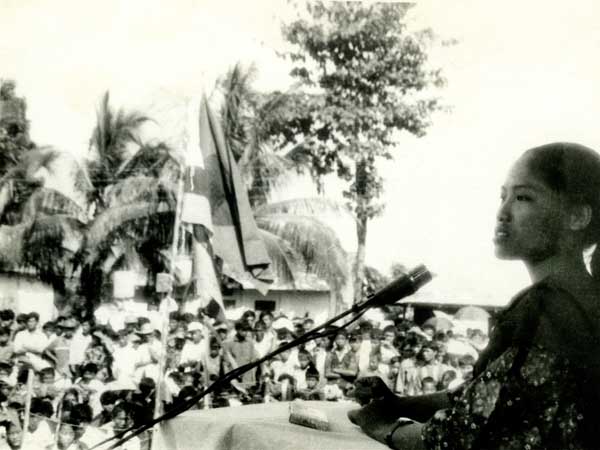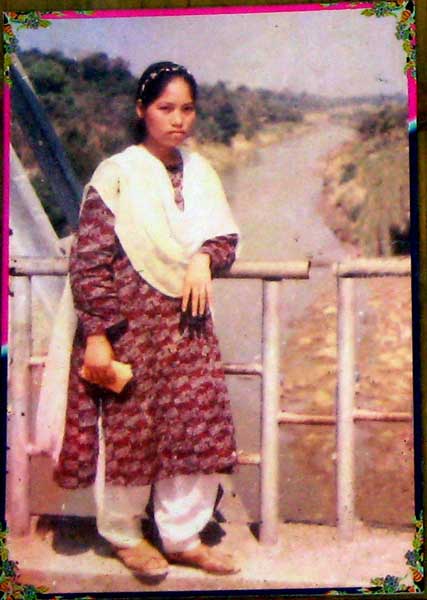Subscribe to ShahidulNews
by Saydia Gulrukh
?Do the words of all witnesses count equally?? asks Kalpana Chakma?s brother Kalicharan Chakma. He brings out his diary as he talks to me and says, ?I have learned from the tragic mistake that I need to keep a record of every encounter that we have with the military, the BDR. Our words do not count.?

I was talking to him after a public gathering at Baghaichari, Rangamati, organised by the Hill Women?s Federation, on the thirteenth anniversary of her abduction, June 12, 2009.
Kalicharan Chakma flipped through his notebook and told me of the countless number of times either he had to visit the zone commander, or the latter paid him a visit at his house. He read out, June 27, 2000, Marisya Zone commander came to our house. And then, these dates, July 26, 2000. August 2, 2005. July 3, 2006. July 26, 2006. Baghaichari Thana, Ughalchari Camp, and then Baghaichari Thana.
It was a routine that continued at uneven intervals. BDR members too would stop him in the bazaar (market). Harassment was at its worst in 2008, he said, after newspaper articles on Kalpana Chakma had been published. New Age, June 12, 2008. Star Magazine, June 20, 2008. After the public meeting in Dhaka. His family had to spend many sleepless nights.

July 3, 2008. July 8, 2008. July 11, 2008. August 11, 2008. August 15, 2008, he read out more dates. Major Iqbal and Subedar Shahjahan along with some BDR jawans came to our house. They were looking for Kalicharan Chakma, they said. We have information, Kalpana is in India. We?ll give you money to bring her home. Kalpana?s brother Ajeet Chakma was reluctant to accept the Tk 3,000 but he was afraid to refuse. With pain and anger in his eyes, he asks, ?What kind of harassment is this? It has been more than a decade, we don?t know what happened to our sister. We are the victims of a crime, we were standing in the water with her when they fired on us. I saw Lt Ferdous with my own eyes, I saw VDP members Saleh Ahmed and Nurul Huq. I see them walking around everyday in Bangali Para. Nobody ever interrogates them.? Voice choked in anger, he paused, then went on, ?At Baghaichari thana on August 15, 2008, the police officer accused me of defaming the Bangladesh military. They accused me of hiding Kalpana in India. I asked him, if you know so well that she is in India, why don?t you arrange for her return? But they got angry when I asked these questions, we are not supposed to raise our voices, we are merely Chakma, we are merely tribal people.?
Kalpana Chakma?s sister-in-law told me it?s not only BDR and police surveillance (nojordari). There are other things, too. After the BDR mutiny (February 25-26, 2009), rumours flew that Lt. Ferdous, the government had spun tales that she had eloped with him, now, rumour had it, that he was killed in the mutiny, Kalpana is now widowed with two children. Her sister-in-law asks me, who on earth spreads such rumours? What do they gain? I also listened to the tremendous social pressure that her family has been facing for the last two years, to perform the last rituals for Kalpana. Her brother says, they think that if they can get me to perform dharma for Kalpana, the government can use that as a reason to close the case.
Others, Kalpana?s neighbours, who had accompanied Kalicharan Chakma to the army camp, and to Baghaichari Thana, requested me to leave out their names, they had witnessed the argument that had taken place between Lt Ferdous and Kalpana in 1996, but they were afraid. After all, they have seen at close quarters what life has been like for Kalpana?s family for the last 14 years. Constant state surveillance.
In Road To Democracy, a private TV channel?s popular talk show (August 18, 2009), Dr Mohiuddin Khan Alamgir, an Awami League presidium member, who also had played a central role in negotiating and signing the Peace Treaty, let the cat out of the bag. While discussing the ethnic conflict in the CHT, he publicly acknowledged that Kalpana Chakma had been abducted by a lieutenant of the Bangladesh Army.
The government can no longer look the other way. We demand that the whole truth be made public. And that the harassment and surveillance of Kalpana?s family members should cease.
Saydia Gulrukh is a PhD student in anthropology at the University of North Carolina (Chapel Hill), USA.
Published in New Age
